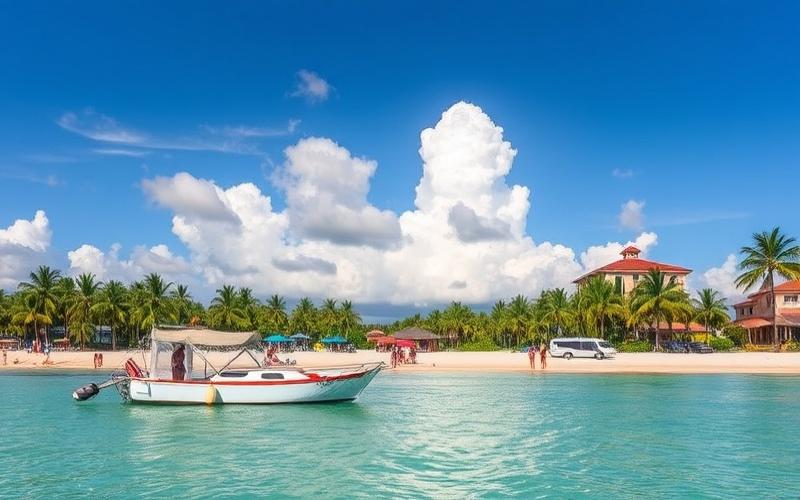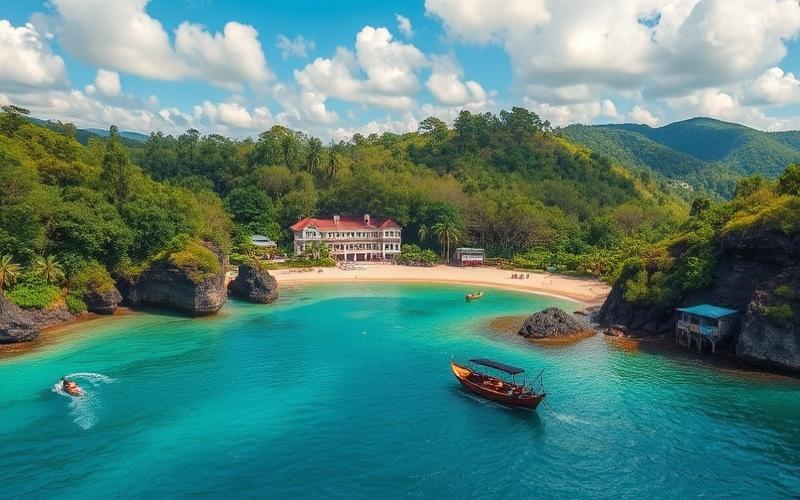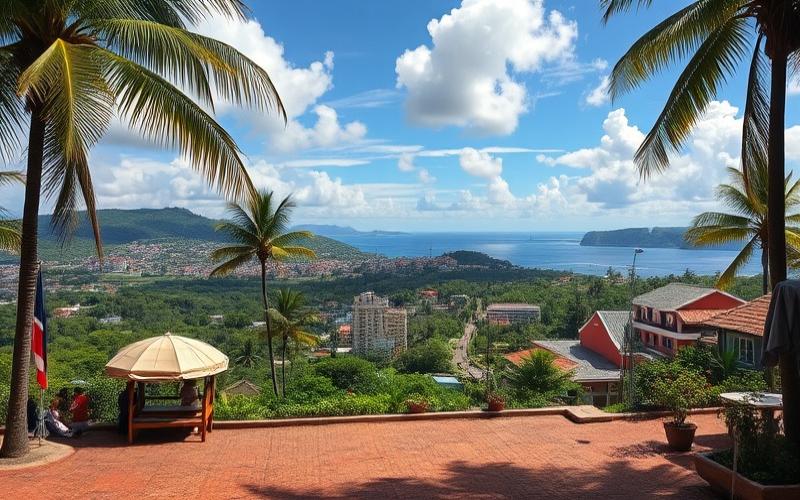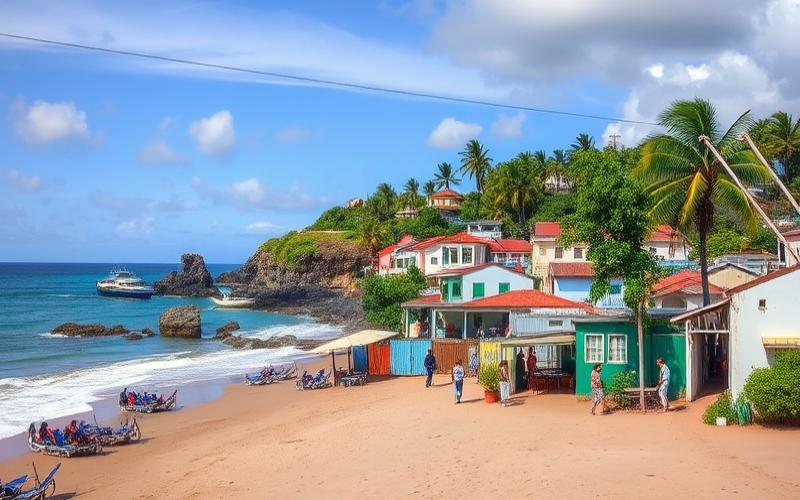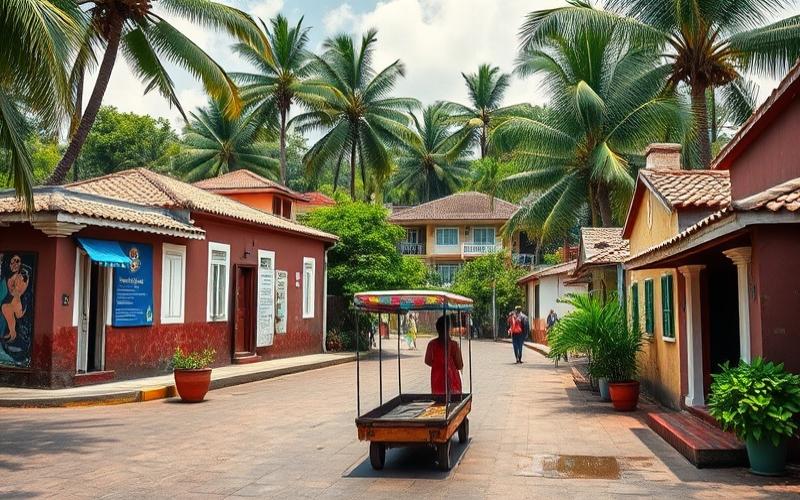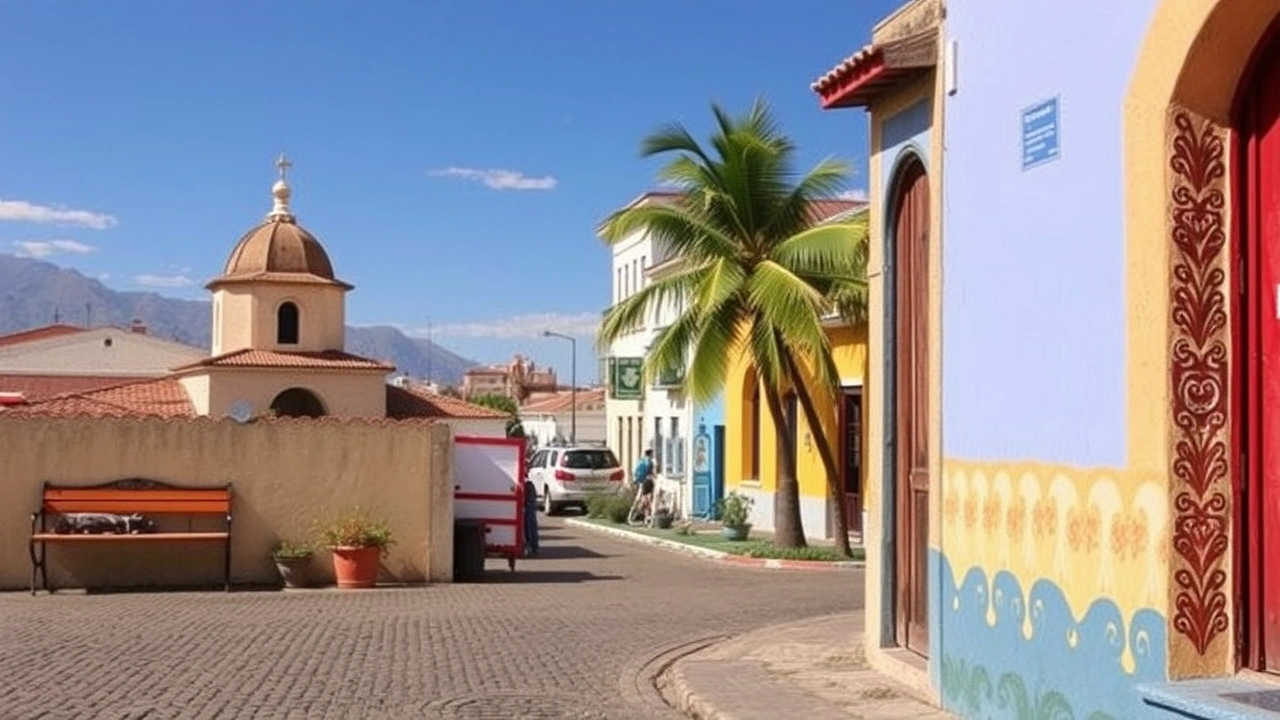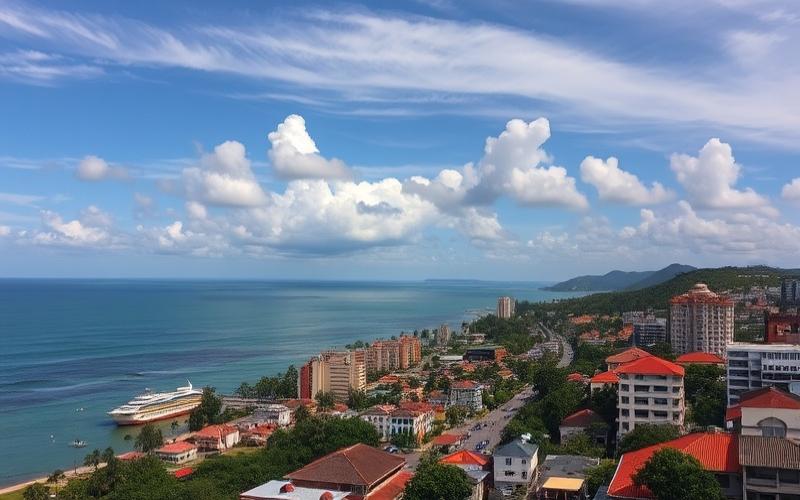
 Published on and written by Cyril Jarnias
Published on and written by Cyril Jarnias
The Dominican Republic, with its white sand beaches, tropical climate, and affordable cost of living, attracts many foreign investors eager to acquire property under the Caribbean sun. However, real estate purchase in this country can prove complex and carry risks for uninformed buyers. In this article, we will explore the most common mistakes to avoid when purchasing real estate in the Dominican Republic, to help you make your investment with complete peace of mind.
Failing to verify the property title: A major risk not to overlook
One of the most serious mistakes one can make when purchasing real estate in the Dominican Republic is failing to conduct a thorough verification of the property title. This negligence can have disastrous and potentially costly consequences for the buyer.
The property title system in the Dominican Republic
It’s important to understand that the property title system in the Dominican Republic differs from that of many other countries. Historically, many properties don’t have clear titles or are subject to multiple claims. This complex situation has its roots in the country’s history and informal land transfer practices.
Risks associated with an unverified property title
Purchasing a property without thoroughly verifying the title can expose the buyer to several risks:
- Buying a property that doesn’t legally belong to the seller
- Getting involved in property disputes
- Facing third-party claims on the property
- Losing your investment if the title proves invalid
How to avoid this mistake?
To avoid this trap, it’s crucial to:
- Hire a local attorney specialized in real estate law to conduct thorough title research
- Verify that the property is properly registered with the Property Registry
- Ensure the seller possesses a valid and uncontested property title
- Require a certified copy of the property title before proceeding with the purchase
Good to know:
In the Dominican Republic, it’s highly recommended to work with a reputable local notary and a real estate attorney to ensure the validity of the property title before any transaction.
Underestimating the importance of due diligence: A carelessness that can cost you dearly
Another common mistake when purchasing real estate in the Dominican Republic is neglecting or rushing the due diligence process. This crucial step ensures all aspects of the transaction are in order and comply with local laws.
What is due diligence?
Due diligence is a thorough investigation and verification process that must be conducted before purchasing real estate. It covers various aspects such as:
- Verifying the legal status of the property
- Examining building permits and authorizations
- Verifying property-related taxes and fees
- Assessing the physical condition of the property
- Verifying usage or development restrictions
Risks of insufficient due diligence
Neglecting this step can lead to serious consequences:
- Buying a property with hidden defects
- Ending up with unpaid tax debts
- Facing compliance issues with local regulations
- Being limited in future use or development of the property
How to avoid this mistake?
To conduct effective due diligence:
- Hire an experienced local attorney to conduct necessary verifications
- Have a detailed property inspection performed by a qualified professional
- Verify all property-related documents, including permits and taxes
- Research development projects in the area that could affect property value
Good to know:
Due diligence in the Dominican Republic can take time. It’s important not to rush and ensure all necessary verifications have been completed before finalizing the purchase.
Ignoring foreign ownership restrictions: An oversight with unfortunate consequences
Although the Dominican Republic is generally welcoming to foreign investors, there are certain specific restrictions and regulations concerning foreign ownership. Ignoring these rules can lead to significant legal and financial problems.
Main restrictions to know
In the Dominican Republic, foreigners have the right to purchase real estate, but certain restrictions apply:
- Limitations on purchasing border or coastal lands
- Restrictions on acquiring large agricultural land areas
- Specific regulations for real estate development projects
Consequences of ignoring restrictions
Disregarding these restrictions can lead to:
- Invalidation of the purchase
- Fines or legal sanctions
- Inability to obtain certain permits or authorizations
- Difficulties selling the property in the future
How to avoid this mistake?
To avoid problems related to foreign ownership restrictions:
- Consult a local attorney specialized in real estate law to understand applicable restrictions
- Verify the status of the property you wish to purchase with competent authorities
- Consider creating a Dominican company for the purchase if necessary
- Ensure you obtain all necessary authorizations before proceeding with the purchase
Good to know:
Although certain restrictions exist, the Dominican Republic generally offers a favorable environment for foreign investors. A good understanding of local rules will allow you to make your investment legally.
Neglecting tax aspects: An omission that can burden your budget
A common mistake when purchasing real estate in the Dominican Republic is underestimating or ignoring the tax implications of the transaction. This negligence can have significant financial consequences in both the short and long term.
Main taxes to know
In the Dominican Republic, several taxes are associated with purchasing and owning real estate:
- Property transfer tax (generally 3% of the property value)
- Annual property tax (IPI – Impuesto a la Propiedad Inmobiliaria)
- Capital gains tax upon resale
- Municipal taxes varying by locality
Risks related to tax negligence
Not taking these tax aspects into account can lead to:
- Unexpected costs during purchase
- Penalties for non-payment of taxes
- Difficulties when reselling the property
- Problems with local tax authorities
How to avoid this mistake?
To effectively manage the tax aspects of your real estate purchase:
- Consult a local accountant to understand all tax implications
- Include tax costs in your purchase budget
- Ensure all previous taxes have been paid before purchase
- Plan for regular payment of property taxes after acquisition
Good to know:
Although tax rates in the Dominican Republic are generally moderate compared to other countries, it’s crucial to understand and plan your tax obligations well to avoid any unpleasant surprises.
Relying solely on verbal promises: A risky overconfidence
In a country where personal relationships play an important role in business, it can be tempting to rely on verbal promises from sellers or real estate agents. However, this practice can prove extremely risky when purchasing real estate in the Dominican Republic.
Dangers of verbal agreements
Relying solely on oral promises exposes the buyer to several risks:
- Misunderstandings about transaction terms
- Difficulties asserting rights in case of dispute
- Unexpected changes in sale conditions
- Inability to prove certain seller commitments
Potential consequences
This excessive trust in verbal agreements can lead to:
- Costly and time-consuming disputes
- Loss of rights or advantages promised orally
- Unpleasant surprises after purchase finalization
- Difficulty obtaining compensation if commitments aren’t honored
How to avoid this mistake?
To protect yourself against risks related to verbal promises:
- Require all agreements to be put in writing
- Have a detailed sales contract drafted by a local attorney
- Request written proof for all important seller claims
- Don’t pay any deposit without a clear, signed written agreement
Good to know:
In the Dominican Republic, as in many countries, only written agreements have legal value. Even though personal relationships are important, prudence requires formalizing everything in writing.
One of the most common mistakes when purchasing real estate in the Dominican Republic is not accounting for all costs associated with the transaction. This underestimation can seriously affect your budget and compromise your investment.
Hidden costs to consider
Beyond the purchase price, several additional fees must be considered:
- Notary fees (generally between 1% and 2% of sale price)
- Attorney fees
- Property Registry registration fees
- Inspection and appraisal costs
- Document translation fees
- Real estate agency commissions (if applicable)
Consequences of poor estimation
Not anticipating these costs can lead to:
- Significant budget overrun
- Difficulties finalizing the transaction due to lack of funds
- Need for additional loans at the last minute
- Unnecessary financial stress during the purchase process
How to avoid this mistake?
To properly manage your real estate purchase budget:
- Request a detailed estimate of all fees from your attorney or real estate agent
- Plan for a safety margin of at least 10% of the purchase price for additional costs
- Make an exhaustive list of all potential fees before committing
- Consult other foreign buyers to get a realistic idea of total costs
Good to know:
In the Dominican Republic, additional costs typically represent between 5% and 10% of the purchase price. Careful planning will help you avoid unpleasant financial surprises.
Neglecting location importance: A decision with lasting consequences
Although it may seem obvious, many foreign buyers underestimate the crucial importance of location when purchasing real estate in the Dominican Republic. This negligence can have significant repercussions on your investment value and quality of life.
Key location-related factors
In the Dominican Republic, several location-related aspects deserve particular attention:
- Proximity to beaches and tourist attractions
- Accessibility and quality of local infrastructure
- Neighborhood safety
- Future development projects in the area
- Exposure to natural risks (hurricanes, floods)
Consequences of poor location choice
Neglecting these factors can lead to:
- Depreciation of your property value
- Difficulties renting or reselling the property
- Quality of life below your expectations
- Unexpected costs related to security or repairs
How to avoid this mistake?
To choose the right location:
- Conduct thorough research on different regions of the Dominican Republic
- Visit the area during different seasons and at different times of day
- Ask local residents and expatriates about life in the neighborhood
- Consult local development plans to anticipate future changes
Good to know:
In the Dominican Republic, certain areas like Punta Cana, Puerto Plata, or Las Terrenas are particularly popular with foreign investors. However, interesting opportunities also exist in less-known regions, provided you do proper research.
Ignoring cultural and linguistic specifics: A faux pas to avoid
A mistake often made by foreign buyers in the Dominican Republic is underestimating the importance of cultural and linguistic differences. This negligence can not only complicate the purchase process but also affect your overall experience as a property owner.
Cultural and linguistic challenges
Several aspects can pose difficulties:
- Language barrier (Spanish is the official language)
- Differences in business practices and negotiations
- Different expectations regarding punctuality and communication
- Cultural nuances in interpersonal relationships
Consequences of this negligence
Ignoring these aspects can lead to:
- Costly misunderstandings during negotiations
- Difficulties understanding and respecting legal procedures
- More difficult integration into the local community
- Unnecessary frustrations and conflicts with local professionals
How to avoid this mistake?
To overcome these cultural and linguistic challenges:
- Learn basic Spanish or hire a trusted interpreter
- Familiarize yourself with local customs and business practices
- Work with local professionals accustomed to dealing with foreign clients
- Show patience and flexibility in your interactions
Good to know:
The Dominican Republic is a country welcoming to foreigners, but making the effort to understand and respect the local culture will be greatly appreciated and facilitate your procedures.
Not planning an exit strategy: A potentially costly lack of foresight
A common mistake when purchasing real estate in the Dominican Republic is not considering an exit strategy from the outset. Whether for future resale or estate planning, not planning ahead can expose you to unexpected difficulties.
The importance of an exit strategy
Several reasons make planning an exit strategy crucial:
- Fluctuations in the local real estate market
- Potential changes in foreign ownership legislation
- Tax implications of a resale
- Succession considerations for heirs
Risks related to lack of planning
Not having an exit strategy can lead to:
- Difficulties selling the property when desired
- Financial loss due to a rushed sale
- Unexpected legal or tax complications
- Succession problems for your heirs
How to avoid this mistake?
To develop an effective exit strategy:
- Consult an attorney specialized in real estate and succession law
- Study long-term local real estate market trends
- Consider different scenarios (resale, rental, transfer) and their implications
- Structure your purchase to facilitate future transaction or transfer
Good to know:
In the Dominican Republic, certain ownership structures, such as creating a local company, can offer more flexibility for future resale or transfer. It’s crucial to explore these options from the beginning of your purchase project.
In conclusion, purchasing real estate in the Dominican Republic can be a rewarding and potentially lucrative experience, provided you avoid these common mistakes. By being vigilant, well-informed, and surrounded by competent professionals, you can fully enjoy your investment in this beautiful Caribbean country.
Disclaimer: The information provided on this website is for informational purposes only and does not constitute financial, legal, or professional advice. We encourage you to consult qualified experts before making any investment, real estate, or expatriation decisions. Although we strive to maintain up-to-date and accurate information, we do not guarantee the completeness, accuracy, or timeliness of the proposed content. As investment and expatriation involve risks, we disclaim any liability for potential losses or damages arising from the use of this site. Your use of this site confirms your acceptance of these terms and your understanding of the associated risks.

























